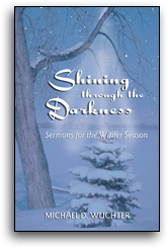SermonStudio
Last Piece Of The Puzzle
Sermon
Shining Through The Darkness
Sermons For The Winter Season
Advent is the time of waiting, of wishing, and of wanting an intervention. Advent is a whisper, or a cry, or a prayer of "Come, Lord Jesus!"
As our member and artist, Teri, stated visually and verbally on our bulletin cover this morning, "Oh, that you would burst forth from the skies and come down ..." (Isaiah 64:1 TLB) or as the New Revised Standard Version translated the Hebrew of Isaiah 64, "O that you would tear open the heavens and come...." Come to us. "Please come, Lord Jesus!"
As our member and artist, Teri, stated visually and verbally on our bulletin cover this morning, "Oh, that you would burst forth from the skies and come down ..." (Isaiah 64:1 TLB) or as the New Revised Standard Version translated the Hebrew of Isaiah 64, "O that you would tear open the heavens and come...." Come to us. "Please come, Lord Jesus!"


